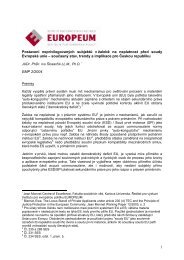eu constitutionalisation - EUROPEUM Institute for European Policy
eu constitutionalisation - EUROPEUM Institute for European Policy
eu constitutionalisation - EUROPEUM Institute for European Policy
Create successful ePaper yourself
Turn your PDF publications into a flip-book with our unique Google optimized e-Paper software.
Chapter 8: EU Development <strong>Policy</strong> in the Constitutional Treaty: a Step <strong>for</strong>ward?SUMMARYStrengthening the EU’s role in the world and its external action were importantpoints during the debate about the future of Europe, the proceedings of<strong>European</strong> Convention and Intergovernmental Conference. As a consequence,the future shape of <strong>European</strong> development cooperation has also been influenced.In this connection, the provisions of the constitutional treaty should be analysedwith regard to the links among all aspects of EU’s international relations.The following points have to be considered:1. International solidarity is quoted as one of EU’s underlying vocations.However, as the <strong>European</strong> Union and its member states are already thebiggest donors of development assistance worldwide and this part of EU’sactivities is widely accepted by society, one may miss a stronger commitmentin the constitutional treaty to international solidarity as a guidingprinciple in the <strong>for</strong>mulation of the EU’s role in the world.2. In the treaty, development policy remains in a special category of sharedcompetence, where the so-called principle of pre-emption does not apply.This confirms development cooperation and the provision of humanitarianaid as first and <strong>for</strong>emost a national prerogative.3. Although the goal of reducing poverty is elevated to an objective of EUexternal action (and its importance is repeated three times in the maintreaty text), the possible tensions between different areas of external actionseem not to have been thoroughly considered. It is hypothesised that thiscould lead to internal conflicts in the EU’s external action in the future.4. The treaty differentiates between development cooperation, financial,economic and technical cooperation and humanitarian aid; however thereis no clear definition of the development cooperation as such.5. The concept of coherence between policies has been upgraded, and anarticle on coherence as a requirement <strong>for</strong> all EU’s policies has been placedat the beginning of Part III of the treaty.6. Creation of a double-hatted post of <strong>European</strong> Foreign Minister (EFM),responsible in the Council <strong>for</strong> CFSP and in the Commission <strong>for</strong> externalrelations and coordination of other aspects of EU’s actions, may lead tosituations where the EFM’s personal interests and attitudes will have a disproportionateinfluence on the EU development cooperation policy.7. As a treaty does not include radical change on the Commission structure,the position of the development cooperation may also depend on thepersonal decisions of the Commission’s President.278Chapter 8: EU Development <strong>Policy</strong> in the Constitutional Treaty: a Step <strong>for</strong>ward?8. Creation of <strong>European</strong> External Actions Service will contribute to thestrengthening of the EU strategic vision. However, the possible inclusionof development specialists into the External Service remains an open question.This is important <strong>for</strong> the proper realisation of development cooperationin EU <strong>for</strong>eign policy, although appropriate management procedureswould have to be put in place to support such institutional change.INTRODUCTION“As any other power in the world, the <strong>European</strong> Community is predestinedto speed up the necessary global changes of our awareness.It is, in fact, an example, how hostility, contradictions and socialdiscrepancies may be overcome thanks to common ef<strong>for</strong>ts. There<strong>for</strong>eit is the most obvious task that the Union should contribute to thepropagation of its fruitful cooperation model in the world.”1The development cooperation (called also interchangeable development policy)includes different <strong>for</strong>ms of aid, exchange and contacts between developedand developing countries undertaken <strong>for</strong> the purpose of economic and socialdevelopment of the latter. Development cooperation can be conducted in thebilateral or multilateral contacts within international organisations. In the caseof <strong>European</strong> Union’s member states the situation is much more complicatedas the Community also has its own development policy.History, development and diversity of this cooperation are subjects <strong>for</strong>separate analysis. It is worth pointing out that the EU and its memberstates are the biggest donor of development aid worldwide. Public opinionpolls show that this <strong>for</strong>m of EU activity has a wide public support.Almost 75 per cent of the population agreed that helping the poor inAfrica, South America and Asia is important or very important². One caneven argue that the international solidarity is an important step towardsestablishing a bona fide <strong>European</strong> identity.1) Barbara Simons, MEP, [quoted in:] epd – Entwicklungspolitik, no 17/1997, p. 16.2) EUROBAROMETER 50.1, p. 2.279








